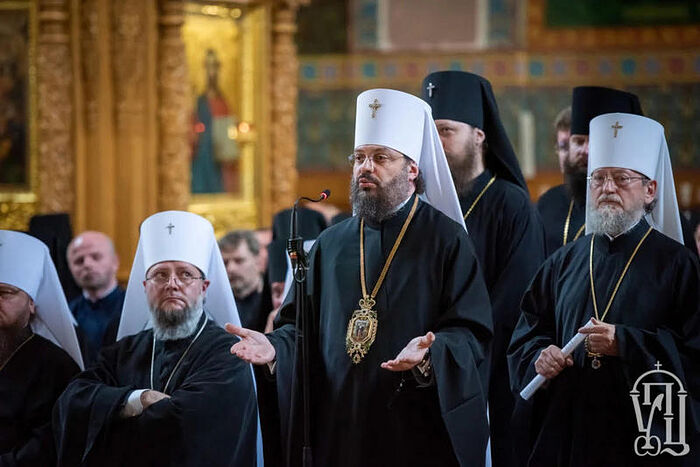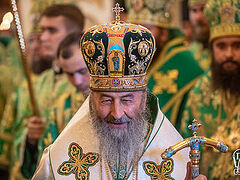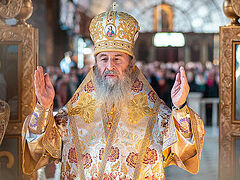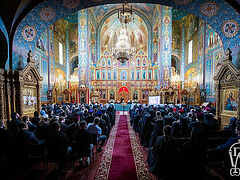Lvov, Ukraine, June 6, 2022
Last weekend, His Eminence Metropolitan Mitrophan of the Diocese of Gorlovka and Slavyansk, in the territory of the contested Donetsk People’s Republic, addressed parishioners about the Council of the Ukrainian Orthodox Church that took place in Kiev on May 27.
According to Met. Mitrophan’s recollection, the majority of people who spoke during the open discussion were in favor of maintaining the status quo as an autonomous Church within the Moscow Patriarchate. The Metropolitan himself voted against the changes to the Statutes and announced that he will continue to commemorate both His Holiness Patriarch Kirill and His Beatitude Metropolitan Onuphry.
His Eminence Metropolitan Philaret of Lvov in western Ukraine has also shared his recollections and reflections on the Council in an interview published on the diocesan website.
According to him, about 80% of those present at the Council of the UOC spoke in favor of the Church’s new status, which he understands as complete independence from the Russian Church in every way.
“All the norms that still connected our Church with the Moscow Patriarchate were completely deleted from the UOC Statutes. So now we are completely outside the Russian Orthodox Church. Patriarch Kirill is no longer the primate of our Church in any form,” says Met. Philaret, noting in particular that the UOC’s unity with other Local Churches no longer comes through the Russian Church, and that the UOC is no longer bound by the decisions of the Russian Council of Bishops.
Based on the changes to the Statutes, “it’s possible to say that these are really two separate Local Churches,” Met. Philaret affirms. But at the same time, “Autocephaly is a process—the process of recognizing a Local or independent Church.”
“The historical experience of the Church shows that there were such precedents when a Church didn’t have autocephaly, but its independence was recognized by other Churches without any subordination. We understand that this recognition was necessary as a transition period,” the Lvov hierarch continues.
Presumably he is referring to situations such as that of the Russian Orthodox Church Outside of Russia before its reunion with the Moscow Patriarchate in 2007.
The clergy and people of Lvov have been praying for independence since the 1990s, Met. Philaret says, but the war was the straw that broke the camel’s back, when the people saw that Pat. Kirill didn’t address them as his flock or come to their defense.
Of course, violent church seizures are a real problem in Ukraine, but Met. Philaret believes this point is unjustly used to justify the war. “The Ukrainian Orthodox Church became a hostage to the Kremlin’s statements during the war. We didn’t ask Moscow to protect our Church and we don’t want it. We suffer together with our people. We don’t need to be protected. This is our country, our sacred land, and we will find a common language among ourselves.”
Recall, however, the opposing view of Met. Mitrophan of Gorlovka, that the Patriarch hasn’t in any way abandoned his Ukrainian flock.
The hierarch of Lvov feels, however, that “The Moscow Patriarchate has never understood the UOC and its clergy and people,” and that the status of the UOC should have been resolved long ago. And while some within Ukraine speculate that the statute changes are just another Kremlin deception, Met. Philaret is certain that this is no cunning wordplay, but a real, new status for the Church.
Asked whether the UOC could split into pro- and anti-ROC factions, Met. Philaret notes that the bishops who directly participated in the Bishops’ Council voted unanimously in favor of changing the Statutes. At the same time, he acknowledges that hierarchs from nine dioceses from the areas under Russian control were unable to participate in the Bishops’ Council due to internet problems.
Note that at least seven dioceses from these areas, the latest being the Lugansk Diocese, have announced that they reject the changes and will continue to commemorate the Patriarch. One diocese has even resolved to suspend commemoration of Met. Onuphry.
“Perhaps we should give them this opportunity,” to commemorate the Patriarch, Met. Philaret continues. “This will be their decision and their responsibility to the Church and the Ukrainian people. But I don’t have the feeling that any communities will decide to maintain subordination to the Russian Orthodox Church during a terrible war.”
However, he does later acknowledge that there are dioceses that have expressed the desire to remain under the Patriarch’s omophorion.
Asked how the decisions of the UOC Council differ from what “Patriarch” Philaret Denisenko did 30 years ago, Met. Philaret emphasizes that Denisenko left with just a few bishops, whereas the UOC Council represents the real desire of the suffering Ukrainian people.
Asked about the various opinions expressed throughout the sessions on Friday, Met. Philaret states that about 80% of those who spoke at the morning discussion spoke of the need for independence. The other 20% emphasized the need to maintain unity with the ROC, though even some of these spoke in favor of autocephaly, but only if granted by the ROC.
Conversely, according to Met. Mitrophan of Gorlovka’s recollections, most people spoke against changing the Church’s status.
According to Met. Philaret, the Ukrainian Holy Synod will begin implementing its decisions and conducting dialogue with other Local Churches about its new status.
Asked how other Local Churches could response, Met. Philaret states:
I have direct information from the bishops of various Local Churches that they received the decision of the UOC Council on full independence from Moscow positively. The Ukrainian Orthodox Church is one of the most powerful Churches in the world… Bishops from Local Churches who have come to us to participate in Church celebrations and events believe that the UOC should have been autocephalous for a long time now, and they conveyed this information to their Synods. Let’s hope that we will reach an understanding in dialogue with the other Local Churches. At the same time, we must take into account that Churches may focus on Constantinople or Moscow in their decision-making.
The Russian Holy Synod responded to the UOC Council with understanding of the difficult situation the UOC finds itself in, but regret over the fact that many dioceses no longer commemorate Pat. Kirill.
Follow OrthoChristian on Twitter, Vkontakte, Telegram, WhatsApp, MeWe, and Gab!





